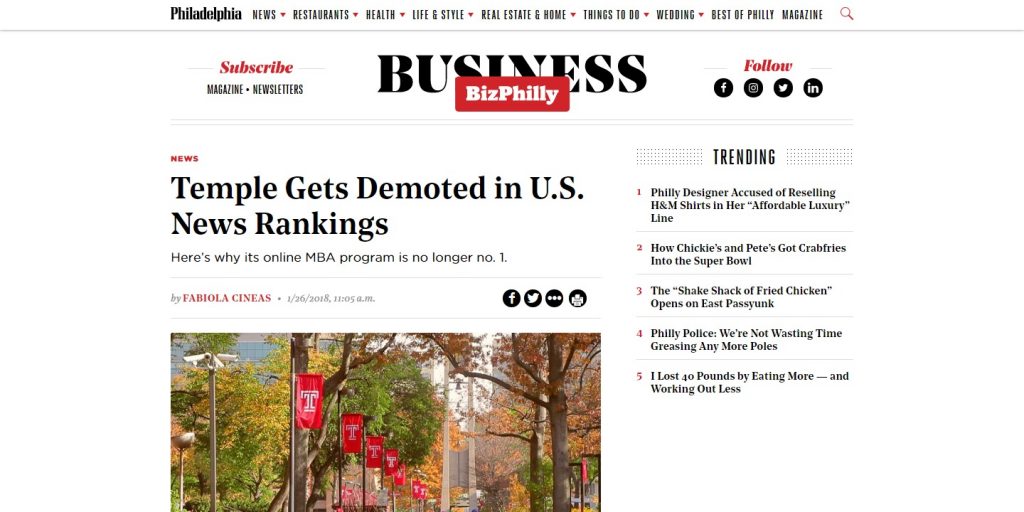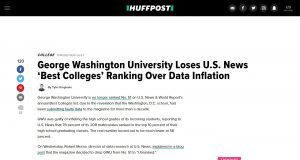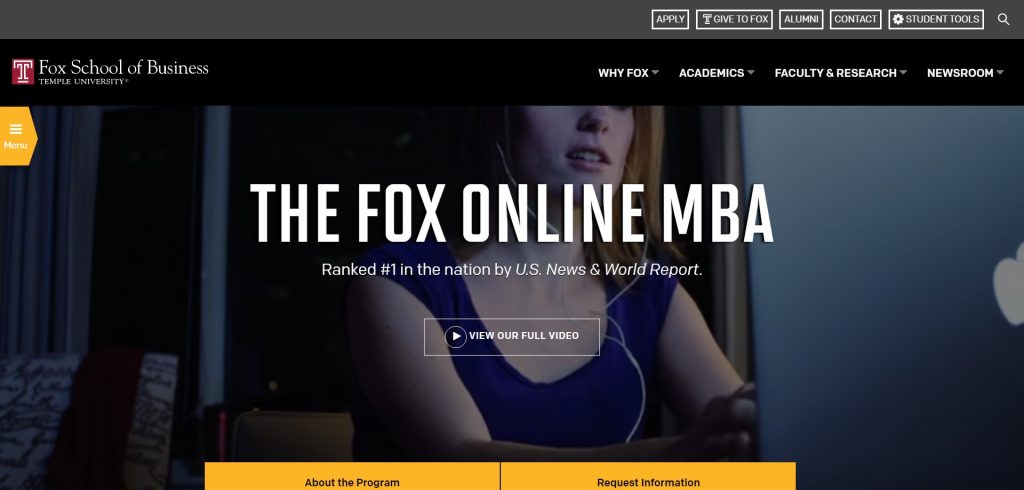News Roundup – Rutgers MBA Wins Big, HBS Professor Weighs in on EY’s Recent Press, and More

Let’s take a look at some of the biggest stories from this week, including a Rutgers award winner, and much more.
Student’s Excitement for Business Problem Helped Her Win Award – Rutgers Business School News
The National Black MBA Association recently honored Rutgers Business School MBA student Livonia Mitchell with the “Best Presenter” award in its annual case competition last month. It was Mitchell’s first time participating in such an event.
Fiat Chrysler Automobiles sponsored the competition, which includes students from 36 other schools. Students were required to present a case for how Fiat Chrysler could make a subscription car program profitable. They were required to present a marketing plan and a business model.
Mitchell, Director of Operations Excellence at Ports America, says of of her win, “The story really spoke to me … I connected with it. I think a lot of that came out.”
She is currently enrolled in RBS’ part-time MBA program, and plans to declare a concentration in Strategy and Leadership. For more on the competition at the Rutgers award winner, you can read here.
Enlightened Solutions: Modular Housing Developments for L.A.’s Homeless – UCLA Anderson School of Management News & Events
Two recent grads of the UCLA Anderson MBA program got some incredible news this month.
Their proposal to the LA City Council for housing for the homeless is to receive major funding to go forward. The nearly $24 million was granted to Greg Comanor (’19) and Aaron Sassounian (’19) to make their capstone project a reality.

The two created a project which combines affordable housing units, health care, and other services into one development using a for-profit model. Using Anderson’s Business Creation Option, the pair raised seed money with a friends-and-family campaign, and purchased a site in L.A.’s Watts neighborhood.
Comanor says of their concept, “Aaron and I were both real estate-focused students, coming from backgrounds in venture capital, investment banking, retail and multifamily development …We felt a nudge to do something socially conscious.”
In order to make the project truly come to fruition, they formed Daylight Community Development, which uses shipping containers to create modular units with the help of creative financing strategies.
Daylight’s Executive Director Tim Kawahara says of Daylight’s team, “They have identified a market niche where financial returns and social impact intersect. These are the types of solutions we need in order to build our way forward.”
You can read more on Daylight and their projects here.
Scholarship to Honor Professor John Dealy’s Commitment to Gender Equity in the Technology Industry – Georgetown McDonough School of Business
This month, Georgetown University’s McDonough School of Business established the Dealy Scholarship, a merit-based award for students who exemplify the values of gender equality in technology, finance, consulting, or other business fields.
Prashant Malaviya, Senior Associate Dean of MBA Programs at McDonough, says, “Gender equity is important to the future of business—whether in an MBA program or a corporate boardroom, there is tremendous value in diversity and inclusion … We are excited to begin awarding the Dealy scholarship to individuals who show [this] commitment.”
All applicants to the full-time MBA program will be eligible for the award, but they must show the qualities exemplified by Healy’s legacy. Joe Verbrugge (MBA ’97), says:
“John represented the reason you’d want to go to a school like Georgetown. [He] was the epitome of ‘we are all created equal’ here. He believed that whether you are a man or a woman, it’s about effort, diligence, and the creativity you bring to the work in front of you … He nurtured women leaders in a space where there aren’t a lot of women leaders; he gave amazing opportunities to anyone who put in the effort.”
Dealy passed away in 2017 after courageously fighting leukemia. His daughters, Anne and Marian, are both graduates of Georgetown. Anne, an attorney, and Marian, a microbiologist, were both present to comment on their father’s gift to the school and to his family.
“This scholarship is a very sweet recognition of my Dad,” Anne says. “He would very much appreciate [its] generosity and vision.”
You can read more on the Dealy family and the scholarship here.
NYU Stern Broadens Scope on Risk Assessment and Management with its Newly Expanded Volatility and Risk Institute – NYU Stern News & Events
NYU Stern recently announced the expansion and renaming of its Volatility and Risk Institute (VRI).
Since its creation a decade ago, the Institute and its associated V-Lab have provided measurement in real-time, along with forecasts of volatility for a vast array of financial assets.
The VRI will be directed by two NYU Stern faculty: Nobel Laureate Robert Engle, Professor of Management and Financial Services and creator of the V-lab; and Richard Berner, Professor of Management Practice and former Director of the Office of Financial Research
Raghu Sundaram, Dean of NYU Stern, says:
“I’m delighted to have Rob and Dick, two world-renowned experts on risk management, lead our newly expanded Volatility and Risk Institute … it will be a dynamic interdisciplinary hub [to] bridge the conversation between academia and industry, and to inspire novel research projects to address and manage the changing nature of risk facing today’s global firms.”
For more on the VRI, you can read here.
Women At Ernst & Young Instructed On How To Dress, Act Nicely Around Men – Huffington Post
Robin Ely, Professor of Business Administration at Harvard Business School, recently offered her perspective on some strange advice offered by Ernst & Young at a training forum, which was held in its new Hoboken office in the summer of 2018.
Among the bizarre pointers offered in the “Power-Presence-Purpose (PPP)” training program, geared toward women at EY, were “a good haircut, manicured nails, and well-cut attire that complements your body type… [But] don’t flaunt your body―sexuality scrambles the mind … Signal fitness and wellness.” Other sections of the program included highly questionable statements about the differences in brain size and differences in ability between genders.

Professor Ely, whose expertise lies in race and gender relations in various organizations, says, “There’s not a lot of empirical support [for these] trait differences between men and women … This curriculum is shot through with that assumption.”
Ely has conducted research on law firms that found predominant focus on outmoded stereotypes in companies that had a low percentage of women in the higher ranks. A former EY employee has spoken out about the training and the overall culture of the firm which focused largely on advancing men. Women make up only 12 percent of EY’s lead client service partners, she notes.
“The only way to succeed at EY is to work around the men. I heard that over and over,” she says. For the full Huffington Post article, read here.
Caught: Why Business Schools Might Lie to Improve Rankings

School rankings from sites like Forbes or U.S. News & World Report are often a crucial factor for students before they decide where they should pursue a degree. Using a combination of rankings, standardized test scores, job placement after graduation, and tuition costs, among other crucial factors, a school ranking a quick and succinct look at the relative merits and weaknesses of MBA programs throughout the country—and the world.
There is a lot riding on these rankings: not only do perspective MBAs often make decisions about where to pursue their degree based on these reviews, but graduates can use these rankings to demonstrate the quality of their degree to future employers. With such high stakes, organizations like U.S. News that compile these rankings rely on the accurate reporting of data from each business school.
So, what happens if the information is inaccurate, or worse? Data like student satisfaction and post-graduate salary—which can be so crucial in informing a prospective MBAs choice of school or program—is reported directly from the business schools, which often presents a conflict of interest potential. With so much at stake, would a school ever lie to increase their spot in the ranking?
Unfortunately, it seems the answer is yes. Just last week, the Online MBA program at Temple University’s Fox School of Business—a program that was consistently ranked in the top spot in U.S. News’ Online MBA ranking—vanished from the list. According to the initial announcement, new information had revealed that just 20 percent of Fox students in the Online MBA program had actually submitted test scores, a number that had initially been reported at a perfect 100 percent. Since the formula used by U.S. News weighs test score averages more if over 75 percent of students have submitted them, this inaccurate reporting from Temple Fox would have given the program an undeserved boost in the school ranking.

In the wake of Temple’s removal, questions continue to arise about the lengths schools go for good rankings/Photo via PhillyMag.
In the days since the initial announcement of Temple’s removal from the ranking, even more questions came out regarding the accuracy of Fox’s data. Further investigation found that Temple had reported 100 percent of students taking standardized admissions test for every year since 2014—a suspicious jump from the 25 and 33 percent that had been reported in the years prior. Since the test scores data submitted turned out to be inaccurate, it seems wholly possible that the data had also been misreported for the three years prior; the same years that Temple Fox held the top ranking for Online MBA programs.
This isn’t the first time it’s been discovered that business schools and even undergraduate programs have falsified or reported inaccurate data to boost its rankings. In 2013, Forbes was forced to remove four schools from its ranking of “America’s Best Colleges” due to inaccurate reporting: doctored SAT results from Bucknell University, false acceptance and graduation rates from Iona College, among others. In 2012, George Washington University lost its ranking on U.S. News’ “Best Colleges” list when it was discovered they were inflating the high school grades of their incoming students.

GWU was one of several schools in the past few years to submit false data for a rankings boost/via Huffington Post.
The problem may be even more far-reaching than some may suspect. In 2013, a survey of 576 college admissions officers found that 91 percent believed other colleges to be guilty of falsely reporting their admissions data. Even the school ranking creators themselves are shocked by this trend. In 2013, U.S. News editor Brian Kelly commented, “The integrity of data is important to everybody … I find it incredible to contemplate that institutions based on ethical behavior would be doing this.”
In 2005, the Association to Advance Collegiate School of Business (AACSB) took a deep look into this trend to examine why the issue of falsifying business school data might be so widespread. “Because rankings of full-time MBA programs are commonly presented under the label of ‘best b-schools,’ the public has developed a narrow definition about the breadth and value of business education,” the report states. Since most media rankings don’t consider factors like faculty research or doctoral education, MBA programs have become more likely to invest in more visible aspects of the program, such as facilities and marketing campaigns, which don’t actually deal with the quality of the degree. As a result, even high-quality programs may earn a lower media rank than they deserve based on the factors considered, adding pressure to do what it takes to earn a school ranking that matches what they perceive as the quality of the degree.
“Plenty of people apply to a school because it has reached the summit of a ‘best-of’ ranking, just as many people will see a movie or buy a book after it wins an award. That’s human nature,” Columbia Business School dean Glenn Hubbard told Fortune. “We want to experience the best.”
Whether or not placement in a school ranking truly represents the quality of a degree, it’s easy to see why the pressure is on for many admissions departments. A better school ranking can increase the number of applicants, providing for a more competitive, and diverse applicant pool, which creates a better quality admitted class. The cycle continues: success of these graduates can improve the possibility of future funding, providing more resources for the program and encouraging even more applicants to apply down the line.
“Rankings have become omnipresent in higher education, and they have enhanced the competition among institutions,” said Terry W. Hartle, senior vice president at the American Council on Education, in 2013. “And in any highly competitive environment, there is always a temptation to cut corners.”
For now, the Fox School of Business has been removed from the U.S. News Online MBA ranking. Concerns about false data continue to be evaluated, as organizations like AACSB continue to seek solutions and make recommendations for best practices when it comes to the collection and reporting of admissions data. In 2017, the AACSB publication “On Academic Rankings, Unacceptable Methods, and the Social Obligations of Business Schools,” suggested that schools and organizing bodies work together to find a method of data collection that includes “transparency, interpretability, and the empowerment of individual decision makers by whatever criteria truly suits their individual needs.”
For prospective students, its important to acknowledge this troubling but widespread trend as they make important decisions about where to earn a degree. While school ranking remains an easy way to compare programs against each other, students should consider not just the accuracy of the data but also the kind of factors reported in media rankings. While it seems possible that the number one program in a media ranking may not truly deserve that position, the real top program- the best for each individual’s needs and career goals—will always deserve first place.
BREAKING: U.S. News Removes Fox Temple From Online MBA Ranking

In some surprising news coming out of Philadelphia yesterday, the Temple University Fox School of Business Online MBA program—which had been named the best online offering in the country by U.S. News & World Report for the past four years—has been officially removed from the entire ranking due to misreporting admissions information.
According to Robert Morse and Eric Brooks, “the business school significantly overstated the number of new entrants for its 2016-2017 entering class who submitted GMAT scores. The misreported data resulted in the school’s numerical rank being higher than it otherwise would have been in the overall Best Online MBA Programs rankings and the Best Online MBA Programs for Veterans rankings.”
For the ranking, Fox Temple had originally reported that a remarkable 100 percent of applicants submitted GMAT scores for the survey. However, the school eventually informed the publication that only 50 out of 255 applicants actually submitted GMAT scores; less than 20 percent of the class.
Because of the infraction, the Fox School of Business will be completely removed from the 2018 ranking effective immediately. However, it will be eligible for re-entry on the 2019 ranking.
As of 4 p.m. EST, Fox Temple was still advertising its placement in the ranking on its main website.

Earlier this afternoon, Temple released a statement regarding the change, which contained the following:
Once we discovered the error, we took the proactive approach to promptly self-report in order to correct a mistake. The data submitted overstated the number of incoming Fox Online MBA students who had provided GMAT and GRE scores as part of the enrollment process. It was our hope U.S. News & World Report would recalculate its rankings based upon the submission of revised data. However, we accept the U.S. News & World Report decision.
The Fox Online MBA program still embodies all of the qualities of the nation’s top program, regardless of the revised 2018 ranking. Our program has a long-standing reputation as one of the nation’s best online MBA programs.
We are doubling efforts to verify our data before it is submitted for rankings purposes, and we have every expectation that the Fox Online MBA program will return to its rightful place among the nation’s top programs of its kind in 2019 and beyond. Rankings are a byproduct of quality, and our focus will remain where it always has—on delivering high-quality programs and service to our students.
To ensure the integrity of the Fox School’s reported data and reporting, the University is hiring an outside, independent firm to review all of our school’s data reporting processes, including what happened in this instance, and to make appropriate recommendations. I have directed the entire Fox School to cooperate fully with this review.
Fox losing its spot at the top of the rankings is not unheard of. In 2012, George Washington University lost its spot in the U.S. News general university rankings. However, GWU, at the time, was ranked 51st overall. Temple, in this instance, is suffering a much greater penalty for submitting false information.
Stay tuned for more information on the story as it unfolds.
In the News: Carey Business Professors Lend Expertise to Baltimore Metro Media

Professors from John Hopkins University Carey Business School often serve as experts in the media. Here are a few excerpts of various faculty members sharing their knowledge on a range of business topics. Continue reading…
Graziadio School Professor Makes the Case for More Women on Corporate Boards

Pepperdine University’s Graziadio School of Business and Management (Graziadio School) Professor Bernice Ledbetter wrote recently about the benefits and necessities of placing more women on corporate boards.
Addressing the need for shifts in corporate culture, Ledbetter refers to the “massive” discrepancy between the number of women in the workforce and those serving on boards. Of Fortune 500 company board seats, only 19 percent are held by women. During 2014, women held just 16 percent of S&P 500 company board seats.
Golden Gate Ageno Professor on What Defines a Successful Financial Adviser

A faculty member of the Edward S. Ageno School of Business at Golden Gate University (The Ageno School) recently contributed an article to Time magazine’s money section addressing the needs of those who are in the market for a financial adviser.
This advice proves useful not only for those seeking an adviser, but also for MBAs who are either in the field or preparing for it.
